Ways to Maximize Cybersecurity in Everyday Life

As we continue to rely heavily on digital tools for every aspect of our lives, the importance of maintaining the security of our personal data has only heightened. This article will explore effective ways to maximize cybersecurity in everyday life.
Understanding the Importance of Cybersecurity
Before delving into the specifics of enhancing your cybersecurity, it is crucial to understand why it is so significant. Cyber threats are evolving at a rapid pace. Data breaches, identity theft, online fraud, and malicious software pose a constant threat. A single vulnerability can have catastrophic results, leading to financial losses, damage to reputation, and severe stress. Therefore, it is essential to incorporate cybersecurity practices into our everyday lives.
Use Strong, Unique Passwords
Why Unique Passwords?
Creating unique, robust passwords is a key defense against cyber threats. It prevents unauthorized access to your accounts and protects your sensitive data. The recommended approach is to create complex passwords that combine upper and lower-case letters, numbers, and special characters. Also, using different passwords for each of your online accounts further safeguards you from a domino-effect breach.
Password Managers
Remembering complex passwords for each account can be daunting. This is where password managers come in handy. These tools securely store your login credentials, making it easier to manage multiple accounts while enhancing security.
Multi-Factor Authentication (MFA)
Multi-factor authentication adds an extra layer of protection to your accounts. Even if someone manages to crack your password, they still cannot gain access without the other verification step. This might be a text message sent to your phone, a fingerprint scan, or even facial recognition. Most popular services now offer MFA, and it is advisable to enable it whenever possible.
Secure Your Home Network
Install a Firewall
A firewall acts as a security guard between your devices and the internet. It monitors incoming and outgoing traffic and blocks any suspicious activity. Firewalls can be either hardware or software-based and are often included as part of most operating systems.
Virtual Private Network (VPN)
A VPN establishes a secure connection between your device and the internet, making your online activities private. It encrypts your data, making it unreadable to anyone trying to intercept it. This is especially useful when using public Wi-Fi, where your activities can be easily tracked. The Browsec VPN extension can further enhance your online security and privacy. You can also use an Apple TV VPN or a VPN for any other devices you use to protect your streaming data and maintain privacy.
Regularly Update Your Software
Software updates often contain security patches for newly discovered vulnerabilities. Therefore, keeping your operating systems, applications, and antivirus software up-to-date is crucial. Set your devices to automatically download and install updates to ensure you don’t miss out on any crucial security enhancements.
Be Cautious of What You Share Online
Your personal information can be used against you in various ways if it lands in the wrong hands. Be mindful of the information you share online and adjust your privacy settings on social media platforms to limit the amount of personal information that is publicly available.
Email Security
Phishing emails are a common cyber threat. They appear to be from reputable sources and trick you into revealing sensitive data. Never click on links or download attachments from emails that seem suspicious. Check the legitimacy of the email sender with a DMARC checker. Also, use email services that offer spam filtering and malware detection.
Educate Yourself
Stay informed about the latest cyber threats and the best practices to mitigate them. Remember, the landscape of cyber threats continually evolves, and being aware is the first step to staying secure.
Smartphone Security
Smartphones are treasure troves of personal data. Hence, we need to protect them as well.
Update your OS and Apps Regularly
Just like your computers, keep your smartphone’s operating system and apps updated to benefit from the latest security patches.
Use Biometric Locks
Use biometric features like fingerprint scanning or face recognition to unlock your phone. These provide more robust security than traditional PINs or patterns.
Be Wary of Public Wi-Fi
Public Wi-Fi is convenient, but it’s often unsecured. Cybercriminals can easily intercept your data on these networks. As we’ve already mentioned, using a VPN when connected to public Wi-Fi can protect your data from being intercepted.
Safe Online Shopping
E-commerce has exploded in popularity, but it also attracts cybercriminals. Here are some tips for shopping safely.
HTTPS Websites
Always check if the website URL begins with ‘https’ when shopping online. The ‘s’ stands for ‘secure’ and means that the data transferred between you and the site is encrypted.
Be Wary of Too Good to Be True Deals
Scammers often lure victims with deals that are too good to be true. Always research before making a purchase.
Subscribe to our newsletter